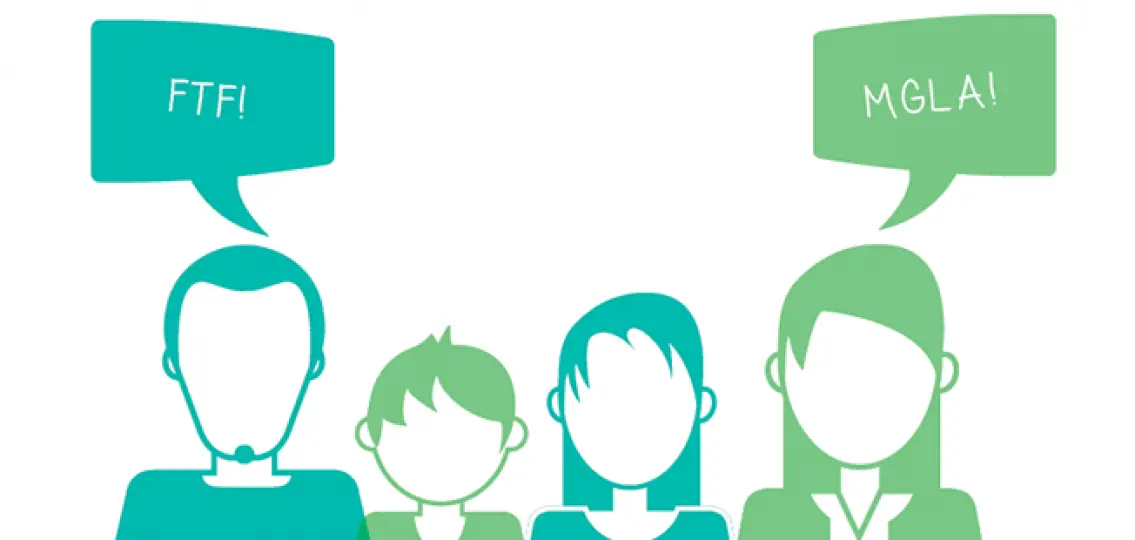On a balmy summer day last year, my 11-year-old son and I were on about mile 10 of a 15-mile bike ride when he started to complain. “My butt hurts,” he said. “It’s hot.” And of course, “How much longer?” I smiled at him and said, “FTF.” I didn’t have to explain what that stood for, because he recognized it immediately: Find the fun.
Our Family Lexicon
FTF is just one of the many acronyms that have changed our family lexicon for the better. The idea began when my son was being mouthy and petulant about something one day and I blurted out, “More gratitude, less attitude.” We both laughed at the rhyme, which I immediately wrote down as MGLA on the whiteboard in our kitchen. Now, when my children act ungrateful or selfish, I simply say “MGLA” and they often are able to course-correct.
I knew from experience that my children would tune out if I lectured them too long about their behavior, a trend that only worsened as my oldest approached the teen years. Raising my voice often escalated the situation into a shouting match. By removing excess language from the equation, these mantras have helped us get to a more positive place pretty quickly—and without rancor.
We worked together to grow our list of family abbreviations, which now includes terms like GNG, for “Giving, not getting,” SIS, for “Say ‘I’m sorry,’” and TAB, for “Take a breath.”
Over the holidays, saying GNG every so often helped my kids to focus on what they could do for others, instead of just thinking about their own holiday haul. SIS often helps to keep an argument from escalating. And TAB reminds all of us to pause and be mindful of the moment. When one of my kids gets wound up over something, I will say “How about we TAB 5?” We’ll then take five deep, cleansing breaths together. Things always seem a bit better afterwards.
Parenting Shorthands
It turns out that these kinds of mantras are aligned with the positive behavior reinforcement that child psychologists recommend. “What I love about these mantras is that they were created collaboratively, outside the heat of the moment,” says Dr. Alison Gardner, a child psychologist and principal of Nurture Child and Family in McLean, Virginia. “You’re naming the behavior that you want them to do. You’re modeling skills you want them to emulate.”
She adds that when children are emotional they’re often unable to tap into the part of the brain that’s receptive to language and reason. These short sayings help children to cross that mental divide more quickly.
The acronyms also fit in with the texting shorthand kids use already, says Marian Moldan, a licensed clinical social worker and principal at New York-based Childhood Anxiety Solutions.
Encouraging Good Behavior
“These mantras are important for children because they are short reminders conveyed in a familiar way,” Moldan says. “Most youngsters will tune out with long-winded explanations. Lecturing can be conceived as nagging and opens the door to pushback. Instead, these are quick and nonjudgmental reminders that are spoken in the technological language of today.”
Moldan adds that although having a common shorthand can help avoid conflict, it can’t replace those in-depth conversations that we need to have with kids, too. On that long bike ride, my son had a hard time coming up with anything that was fun about being sweaty and tired. But I’d opened the door for a more creative way of thinking about it. Eventually, he suggested that we yell out each milepost as we passed it, counting them down. We found the fun.
The other day, my daughter wrote ILYTTMAB on the kitchen whiteboard. She explained what it meant: “I love you to the moon and back.” That acronym doesn’t quite roll off the tongue like the others, but she’s got the right idea.




